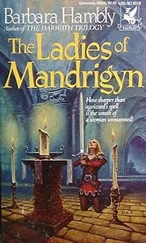But since October, the bark of dogs and the crunch of hooves on the drive had filled her with foreboding that sometimes turned her cold with fear, and sometimes hot with rage.
A child’s voice sliced the air. Half a dozen small figures milled excitedly into sight from the curved walkway that led to the kitchen, trampling last week’s muddy snow. The little ones who helped with chores in the shops and, in summer, in the wide vegetable gardens near the wharf were always on hand to take messages to the house, and could dash up the steep hill from the river long before horses could take the drive. Shivering in the raw cold by the dressing-room window, Martha heard her niece Fanny’s gentle exclamations from the walkway. At nineteen, as the wife of the General’s nephew Augustine, Fanny had stepped into the role of auxiliary hostess at Mount Vernon.
Martha caught the words, “…Mr. Madison,” and her small firm jaw clenched until it ached. The General’s niece Harriot—one of several family members now dwelling under the Mount Vernon roof—cried, “Let’s go tell Aunt!” and Fanny murmured something in reply and, Martha hoped, an admonition about how ladies didn’t shout.
What am I ever going to do with that girl?
The thought of Harriot—of Fanny with her first baby on the way, of the two children of her dead son Jacky whom Martha had taken in as her own, and of the older sisters of those two, who’d journeyed down from Alexandria to have some relief from their mother’s constant illnesses and pregnancies—the thought of Harriot’s older brothers who’d have to be provided for and looked after—suddenly weighed on Martha’s thoughts, and she closed the window without even waiting to see who was arriving at Mount Vernon that morning.
But her knees shook as she returned to her chair by the fire. Her breath was coming fast.
He promised.
Promised not only me, but the Congress and every one of his officers, every one of his soldiers.
I will not become a dictator, he had promised her. A Cincinnatus, not a Caesar. We have not spent eight years ridding ourselves of one despot, to exchange for another. My own vine and fig tree, shared in peace with you, are more precious to me than any palace, any crown.
Martha closed her eyes. She felt thankful beyond measure for her own long-standing rule that the hour after breakfast, when the General rode out to supervise the work on Mount Vernon’s outlying farms, was inviolate. Even Fanny whom she loved like a daughter, even her treasured granddaughter Nelly, knew enough not to knock at her bedroom door during that hour of solitude. When the French clock on the mantel-piece spoke its small sweet note at ten, that would be time enough to take up her weapons and learn what battle it was that she would have to fight.
But her instincts told her that in this inclement season, with Congress reconvening soon, the visitor had to be James Madison. And for a bleak silent moment Martha Dandridge Custis Washington wished the little man dead.

Eight years.
In the fairy-tales of which her daughter—her beautiful Patcy—had been so fond, days of trial and testing for hero and heroine concluded with “happily ever after” and were presumably followed by a lifetime of peace (although, reflected Martha, Heaven only knew what one would talk about with a man who’d spent his youth hopping from lily-pad to lily-pad in the guise of a frog). She’d never read one in which the deserving couple had their years of peace first, their trials and tribulations afterwards, and no end to them in sight.
Her first marriage, at nineteen, to Daniel Custis could certainly not be counted a tribulation, once his frightful father was dead. Plump, middle-aged Daniel had adored her and had showered her with gifts. The only trials she’d passed through had been the deaths of two of their four beautiful children before they reached the age of four…and the appalling legal mess of his Parke grandmother’s legacy, which had fallen upon her, ensnarled in the vast Custis fortune, when Daniel had suddenly died.
As for the General…
George had his trials and his tribulations, reflected Martha. But he was a soldier. Of course there had been times when he’d lain in the hand of Death. Ambushed by the French and Indians in the days before the French had been driven out of Canada, he had brought a division of confused and panicky English soldiers out of the wilderness to safety. When first she’d seen him, stepping out into the sunlight of the Palace Green in Williamsburg in his blue-and-scarlet militia uniform, that was what Daniel had said of him: That’s Colonel Washington, the man who saved Braddock’s troops.
Two years after that they’d been formally introduced, at a ball to celebrate her sister Anna Maria’s wedding to Burwell Bassett of Eltham Plantation: Fanny’s mother. He’d asked her to dance—quite properly soliciting her husband’s permission—and led her out to the floor, a very tall man who seemed taller yet because of the straightness of his carriage, and because of the Indian-like litheness with which he moved. Only a month before that she had lost her daughter, sweet four-year-old Frances. She had almost declined to attend the wedding or the dance.
But when George bowed over her hand, and looked down at her with those remarkable eyes, pale chilly blue like spring sky when the clouds first break, she would no more have refused a request to dance—or a request that he carry her out of the ballroom and away from Williamsburg over the crupper of his horse, for that matter—than she’d have turned away from the warmth of a fire on a freezing night.
She later learned that George had that effect on most women.
As it was, the impact of his presence confused her, because she still did quite sincerely love Daniel….
But this was different. When she thought about it later, she realized this must be what people meant when they spoke of charisma, the potent magic that some people had that made you want to be near them, that made you want to do as they asked.
When he thanked her for the dance—and he danced with the leashed power of a well-schooled hunting-horse going over jumps—his voice was like brown velvet, but she saw that his teeth were very bad. The reason, she understood at once, for his tight-lipped expression, and his snorting, close-mouthed laugh.
He was self-conscious.
And though she continued to love Daniel til he died, the memory of that dance was like a little piece of warmed amber, tucked away in a pocket, that she could touch, in the months that followed, when her hands or her heart felt cold.
Some eight months after Daniel’s death, George came to call on her at the home of mutual friends. During those months she’d been wrestling with the maddening difficulties of keeping the overseers of four plantations from either stealing her blind or half-killing the slaves in order to get work out of them, and with the legal complications of finding a guardian for four-year-old Jacky and two-year-old Patcy, since Daniel had died intestate. In George, she had recognized at once both great strength and great patience, and an intelligence similar to her own. Neither of them was bookish, nor could either be called a philosophical genius. But George, like herself, had a keen understanding of how things worked, and a sharp vision of what was most important in any situation.
And, they laughed at the same things.
The fact that he was twenty-five years old and the most breath-taking man she’d ever seen didn’t hurt matters either.
Happily ever after.

Читать дальше






